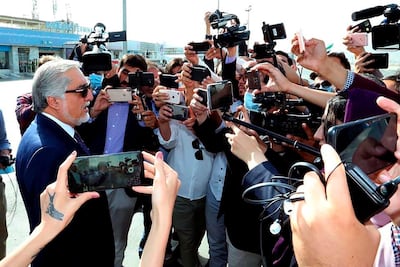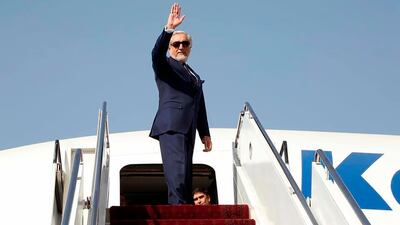A team of negotiators left Kabul on Friday to take part in the Afghan government's first direct negotiations with the Taliban to end after nearly 20 years of insurgency that has killed tens of thousands of people.
"After continuous efforts of the government of the Islamic Republic of Afghanistan to start direct talks with the Taliban, the peace negotiating team of the IRA left Kabul for Doha, the capital of Qatar, today," Nader Naderi, a member of the negotiating team, said on Twitter minutes before their plane took off.
"We are going to Doha to tell the Taliban that you cannot succeed by force," Abdul Hafiz Mansour, a member of Kabul's delegation, told reporters at the capital's airport.
"The time is ready for reconciliation now, we can resolve our problems by talking to each other."

The talks are set to begin on Saturday after months of delay caused by wrangling over a prisoner exchange between the government and insurgents.
The prisoner swap is part of a peace agreement the Taliban signed with the United States on February 29 after more than a year of negotiations in which the Kabul government was not involved.
The US Secretary of State Mike Pompeo left Washington on Thursday to attend the opening of the peace talks, which are expected to last for months. He told reporters travelling with him that the US expected the Taliban to uphold the terms of its agreement with Washington that would ultimately lead to the withdrawal of US forces from Afghanistan.
“There are a series of commitments that the Taliban have made, we have every expectation that they will follow through on them. Our commitment to reduce our forces to zero is conditioned on them executing their obligations under the agreement,” Mr Pompeo said.
“It’s taken us longer than I wish that it had to get from February 29 to here but we expect Saturday morning, for the first time in almost two decades, to have the Afghans sitting at the table together prepared to have what will be contentious discussions about how to move their country forward to reduce violence and deliver what the Afghan people are demanding — a reconciled Afghanistan with a government that reflects a country that isn’t at war.”
Zalmay Khalilzad, the US special envoy who led Washington's negotiations with the Taliban, hailed the start of the intra-Afghan talks as a chance for peace in the country for the first times in four decades since the withdrawal Soviet forces. However, a willingness to compromise would be needed, he said.
"The contemporary history of Afghanistan shows that attempts to monopolise power and impose one's ideology on others by force, create conflicts and push the country into further interference," Mr Khalilzad wrote on Twitter on Friday.
"No significant achievement is ever easy. It is now the responsibility of Afghan leaders to seize this moment and put an end to this brutal and meaningless war."
The start of direct negotiations has raised hope among Afghans that the conflict might come to a halt.
"We are desperate for peace. The killing of Afghans should be stopped," said Kabul shopkeeper Abdullah, who lost a relative in a bomb attack that targeted Vice President Amrullah Saleh this week.
"I'm not very optimistic about the future, but peace talks is a good first step to at least reduce the violence," he told Agence France-Presse.
Afghan schoolteacher Aminullah, who lives in restive Kunduz province, insisted that the country should not gave up gains made since the 2011 the US-led invasion that toppled the Taliban from power.
"As much as we want peace, we also want the achievements of the past years kept," he said.
"I don't want my school closed, but peace is the priority now."

